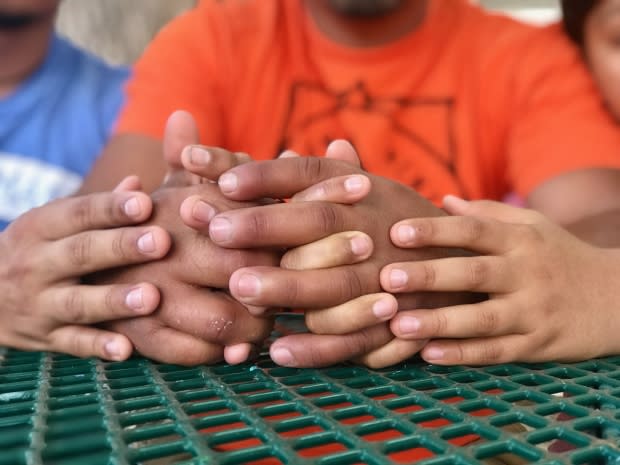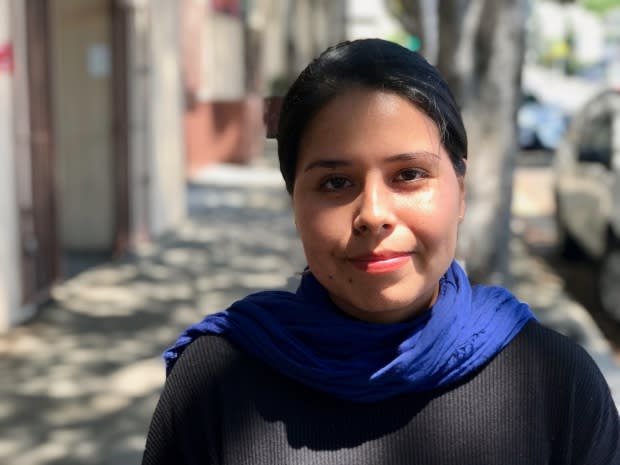Trump's deportation delay defers pain for some migrants, offers lifeline for others
In the gym at the North Hills United Methodist Church in Los Angeles, a salsa band is playing while guests gather around the buffet. The children chasing each other around the tables may be laughing, but among their parents, the mood is strained.
Their fragile existence in the United States is once again threatened by Donald Trump. In less than two weeks, some of them may be gone.
Just after Trump was elected president, Carlos (not his real name) and his two children came to the U.S. and applied for asylum, because they feared retribution from "corrupt" police in their native El Salvador.
"I was scared they would kill me, maybe kill my family," he says, a child on either side of him. "We can't go back to El Salvador. So we decided to come here."
But U.S. authorities denied his claim and ordered him deported. Carlos was hoping he'd have time to appeal, but then last week, Trump announced plans to round up more than 2,000 migrant families awaiting deportation in 10 cities, including L.A.

Unlike some migrants facing deportation orders, going into hiding isn't an option for Carlos. He rolls up his pant leg to reveal an ankle bracelet, which allows immigration agents to track him.
"Our fear is that they arrest us in the streets or while we work, or that they come knocking on our front door," he says. "We didn't come here to harm the country. We just came here to be safe. My kids are in school. It seems unjust. We're no danger."
Trump tweets create confusion
On June 17, a day before Trump launched his re-election campaign, he tweeted, "Next week ICE will begin the process of removing the millions of illegal aliens who have illicitly found their way into the United States. They will be removed as fast as they come in."
The tweet created confusion, as officials from Immigration and Customs Enforcement (ICE) said they weren't aware that the president planned to divulge their enforcement plans. Then, in a tweet hours before the raids were to begin on Sunday, Trump reversed course.
He wrote that he had "delayed the Illegal Immigration Removal Process for two weeks to see if the Democrats and Republicans can get together and work out a solution to the Asylum and Loophole problems at the Southern Border."
Carlos Holguin, a human rights lawyer at the Center for Human Rights and Constitutional Law, says his sources at ICE told him the agency couldn't possibly handle a massive operation like the one initially tweeted by the president.
"The government right now has its hands full with respect to just handling the number of people that they're apprehending at the border," Holguin says. He believes the threat is just empty rhetoric to scare migrants and energize his base ahead of the 2020 election.
"It's really a form of sort of psychological terrorism that the administration is using, knowing it cannot back this up, knowing that even if it can't, people will still become very fearful," Holguin says.

Immigration activists say this isn't the first time the Trump administration has made these kinds of threats. But they "do take every single threat very seriously," says Shannon Camacho, campaign coordinator for the Coalition for Humane Immigrants Rights of Los Angeles (CHIRLA).
Camacho says Trump's decision to delay the raids by two weeks may give immigration activists an important opportunity.
"We've been collaborating since the announcement to do 'you know your rights' presentations, to go out into the community and let our members know that they have constitutional rights regardless if they're undocumented [or not]," Camacho says.
'We want to inform them'
Through Spanish-language videos and community outreach sessions, CHIRLA and other organizations are teaching undocumented migrants that they shouldn't open their door to law enforcement unless they present a signed warrant bearing their name. And if they are detained, they should only give their name and date of birth until they speak to a lawyer.
"We want to inform them before any operation that they have recourse, and that they should have an attorney working with them before anything happens," Camacho says.

It's a message Rev. Fred Morris, pastor at North Hills United Methodist Church, has also been sharing.
He addressed the crowd at the church's recent fundraiser, asking for quiet so they could hear this most practical of sermons. For the past few days, Morris has been reaching out to members of the migrant community about the importance of assigning power of attorney to friends or relatives, which would allow them to care for their children should they be arrested.
If they have nowhere else to turn, he says, they can seek shelter at his church. ICE, he says, is unlikely to break down the doors to arrest them.
"[ICE agents are] not supposed to go into a church or a hospital or a school. They occasionally violate that. But I don't think they're going to," Morris says.
But he says that for migrants who've been in the country for years, it's not easy to leave their jobs and homes in order to seek sanctuary in a church. "That's a pretty high price to pay for short-term protection," Morris says.
His church has no beds. Still, Morris says, a gym floor is much better than a jail cell.


